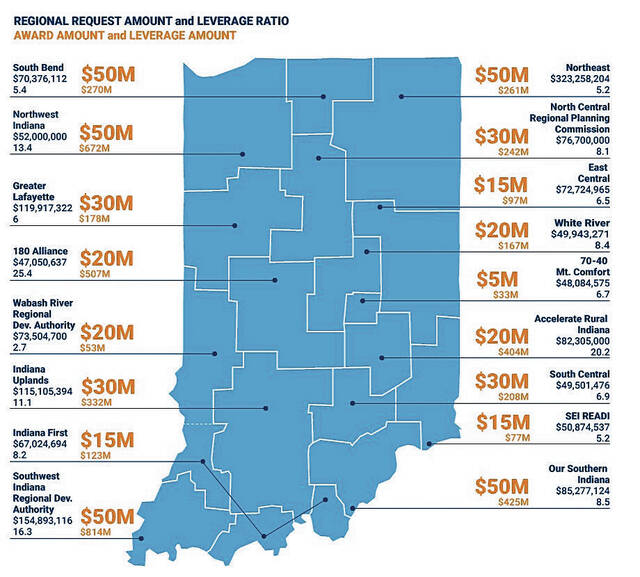About $20 million will flow to Johnson County and the region west and northwest of Indianapolis to attract talent and speed up economic development.
The Indiana Economic Development Corp.’s Board of Directors on Tuesday awarded $500 million in federal money to 17 regions across the state. The program, dubbed Regional Economic Acceleration and Development Initiative, or READI, promotes strategic investments in talent attraction and economic growth on a regional scale with collaboration between multiple counties.
Johnson County is part of the 180 Alliance, which includes five others west and southwest of Indianapolis — Boone, Hendricks, Montgomery, Morgan and Putnam counties. Local officials, along with Aspire Johnson County, collaborated with leaders from those counties to submit a $47 million proposal for growth across the region.
The proposal included projects aimed at meeting six goals the group established for the region: improving downtown quality of life, expanding outdoor recreation, arts and culture, developing housing for talent attraction, improving regional infrastructure and attracting skilled workers, according to the plan.
Leaders from the 180 Alliance know they have been awarded $20 million, but don’t yet have clarity on which local and regional projects will be funded, said Amanda Rubadue, Aspire’s vice president for economic development.
Rubadue expects to learn more about that in January, when state officials plan to provide more details about the award and next steps. Though regional leaders were hoping for more money, the $20 million they received and partnerships they developed between the five counties is still a win, she said.
Next steps include figuring out which projects will move forward and raising funds from public and private entities to pair with the READI allocation to accomplish them.
Money for several Johnson County-specific projects was requested, including $5 million toward a $16 million indoor, outdoor sports park in Franklin, $1.35 million for utility infrastructure to facilitate development at the future Interstate 69 interchange at State Road 144, $375,000 for a road project on Hurricane Road to facilitate a 322-home housing development and $250,000 to support Ivy Tech’s investment in a flex lab at its Franklin campus. Each of those — aside from the Ivy Tech project — would come with an equal local government match.
The application also included a $4.6 million request to fund several regional projects: a mural program, facade grants, a marketing campaign and a regional talent attraction program based on Aspire’s Employer Resource Network. Those projects would each come with an equal local government match to be contributed by communities participating in the 180 Alliance.
Central Indiana READI groups each received $20 million or less, while regions along the state’s the borders, near Chicago, South Bend, Fort Wayne, Evansville and New Albany, received the maximum amount of $50 million each in an effort to draw talent from neighboring states.
Mark Wasky, IEDC’s vice president of innovation and strategic initiatives, told the Indianapolis Business Journal IEDC recognizes central Indiana is where most of the state’s growth is occurring. The goal was to not ignore the region, while also investing to foster growth in the rest of the state, he said.
“The thing that came across our minds was the need to invest in opportunities for growth, and with Central Indiana being the largest regional economy in the state, we couldn’t ignore that,” Wasky told IBJ. “We do hear that quite often at the IEDC that there seems to be a focus on certain areas of the state but at the end of the day, we’re focusing on supporting as many communities as we can, in an effort to grow the state’s population and continue and sustain our economic growth.”
By providing the maximum funding to the border regions, Wasky said IEDC is hoping to pull in new residents from out of state, particularly from the Chicago and Louisville areas.
“All of those are kind of gateways to the state in many ways,” Wasky told The Associated Press. “They’re located within areas that present particular opportunities for the state to be able to leverage large urban areas to attract talent.”
The state board approved $30 million grants to four regions, while another four, including 180 Alliance, will get $20 million. Three others were approved for $15 million and one is receiving $5 million.
Wasky said those reviewing the proposals believed it was important to give some funding to each region to encourage ongoing cooperation.
The Associated Press and Indianapolis Business Journal contributed to this report.





